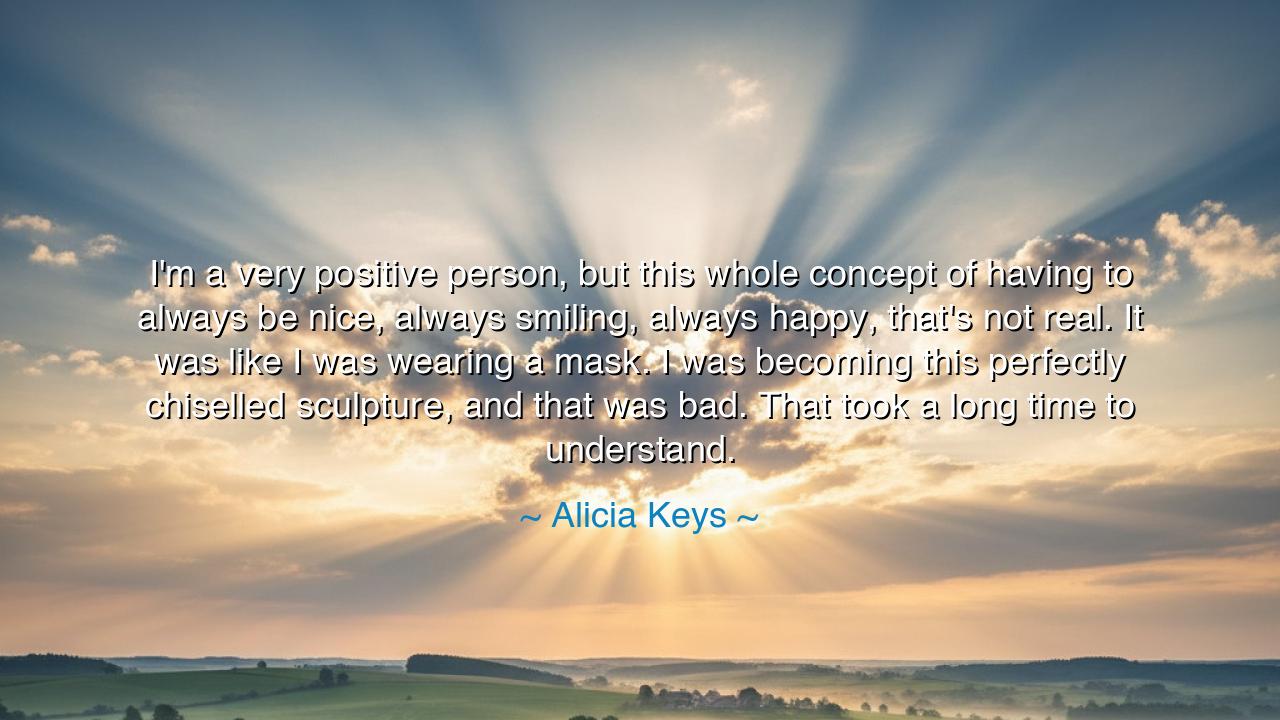
I'm a very positive person, but this whole concept of having to
I'm a very positive person, but this whole concept of having to always be nice, always smiling, always happy, that's not real. It was like I was wearing a mask. I was becoming this perfectly chiselled sculpture, and that was bad. That took a long time to understand.






Hear the voice of Alicia Keys, not only a singer of melodies but a prophetess of truth, who declared: “I’m a very positive person, but this whole concept of having to always be nice, always smiling, always happy, that’s not real. It was like I was wearing a mask. I was becoming this perfectly chiselled sculpture, and that was bad. That took a long time to understand.” These words are the confession of one who walked the path of appearances, who bore the burden of perfection, and who discovered the cost of denying the fullness of the human soul.
To be positive is noble, but to demand that one must be eternally cheerful is a prison disguised as virtue. The ancients warned against such false harmony: the Stoics taught that life is woven of both joy and sorrow, and that wisdom comes not from denying grief, but from embracing it with dignity. Keys unmasks the lie of perpetual cheerfulness, reminding us that no soul can remain forever smiling without breaking. The heart must breathe both laughter and tears, or else it suffocates behind its mask.
Her image of the mask is powerful. It is the face that pleases the world, the shield that hides the storms within. Many wear such a mask, sculpting themselves into flawless images to win approval. Yet, as Alicia Keys learned, such chiselling turns the living being into a lifeless sculpture—admired perhaps, but hollow within. What appears perfect to the eyes of others may be slowly destroying the spirit beneath.
History shows us the peril of this. Consider the life of Vincent van Gogh, whose art revealed his soul’s truth. Had he chosen to wear the mask of polite society, painting only what was fashionable, his genius would have been smothered beneath the demand for conformity. Instead, though mocked and uncelebrated in his time, he refused to sculpt himself into false perfection. His authenticity, painful though it was, became the legacy that moved the world. Better to be raw and real than to be flawless and false.
The teaching here is that authenticity is greater than appearance. To live as a sculpture—smooth, polished, and lifeless—is to betray the very purpose of existence. To live with truth, allowing both sorrow and joy to be seen, is to walk the path of wholeness. Keys reminds us that it may take long years to understand this, for the world rewards the mask more readily than the truth. Yet the soul withers if forced always to be nice, always happy, always unreal.
The lesson for us is clear: do not confuse positivity with denial. True positivity is not the silencing of pain, but the courage to face pain with hope. It is the willingness to say, “I hurt, but I will heal. I fall, but I will rise.” This is not weakness but strength, for it honors the full truth of the human heart. To pretend otherwise is to carve oneself into a lifeless figure, admired but empty.
Practical actions follow. Remove the mask: speak honestly of your struggles with those you trust. Allow yourself to grieve when grief comes, and rejoice when joy returns, without forcing either. Surround yourself with those who accept your whole being, not just your polished exterior. Remember that to be human is to be imperfect, and to be imperfect is to be real. Each day, give yourself permission to live not as a sculpture, but as a living soul of flesh, fire, and spirit.
So remember the wisdom of Alicia Keys: the world may ask you always to smile, but truth asks only that you be real. Cast off the mask, break free of the sculpture, and let your life shine with authenticity. For in the end, it is not perfection that moves hearts, but the raw light of a soul unafraid to be seen as it truly is.






PPhat
This quote sparks curiosity about the tension between public image and private reality. How much of our own behavior is influenced by the desire to appear perfect or untroubled? I wonder if this pressure is more pronounced for celebrities, or if it reflects a universal struggle with authenticity. Could social media exacerbate the sense of wearing a mask, and what practices can help people reconnect with their genuine selves without guilt or fear?
QVLe Quang vinh
I feel a strong connection to this idea, and it raises a question about how cultural narratives about happiness shape self-perception. If constantly projecting cheerfulness can feel like becoming a ‘sculpture,’ does that mean society undervalues vulnerability? I’m interested in perspectives on redefining strength and positivity to include authenticity, acknowledging that being human involves a mix of emotions rather than a curated performance of joy.
CHKim Chi Hoang
Reading this makes me reflect on the harmful impact of societal standards of perfection. How often do we wear masks in our daily lives without realizing it, trying to meet external expectations? I’m curious about the strategies Alicia Keys might have used to rediscover authenticity. Are there ways to balance positivity with honesty about struggles, so that mental health and self-awareness aren’t compromised?
VVVy Vy
This statement really resonates with the pressure society places on people, especially women and public figures, to maintain a constant facade of positivity. I wonder how many people struggle silently with feeling compelled to ‘perform happiness’ just to be accepted. Could this expectation contribute to burnout or anxiety? I’d like to explore how authentic emotional expression can be encouraged in both personal and professional settings without fear of judgment.